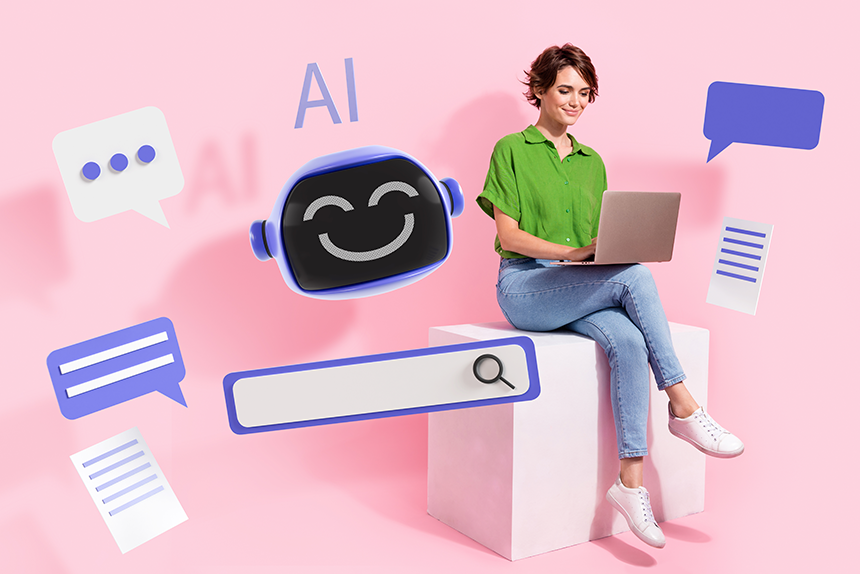In the digital-first era, managing a website, blog, or e-commerce platform requires efficiency, precision, and agility. Enter AI CMS—a next-generation Content Management System enhanced with artificial intelligence capabilities. AI CMS revolutionizes the way content authors, marketers, and developers collaborate, streamlining workflows and creating personalized, high-impact digital experiences. But what exactly is an AI CMS, and how can it boost productivity across the board?
In this article, we'll explore the key features of an AI-powered CMS and the benefits it brings to both content creators and software developers.
What Is an AI CMS?
An AI CMS is a Content Management System that integrates artificial intelligence technologies—such as machine learning, large language models (LLMs), and predictive analytics—into its core functionalities. These AI-driven features help automate repetitive tasks, optimize content delivery, and provide actionable insights based on data, all while improving user experience.
Whether you're running a personal blog, managing a corporate website, or operating an e-commerce store, AI CMS tools can adapt and assist at every stage of content creation, management, and delivery.
Key Features of an AI CMS
1. Intelligent Content Creation
- Content Suggestions: AI CMS can suggest topics, keywords, and content outlines based on trending topics and SEO best practices.
- Automated Content Generation: Using LLM models like OpenAI's ChatGPT and Google's Gemini, the CMS can draft articles, meta descriptions, or product descriptions with minimal input.
- Language Optimization: LLM-powered tools check grammar, tone, and readability, ensuring content aligns with your brand's voice.
2. Dynamic Content Personalization
- Behavioral Analysis: AI analyzes user behavior (e.g., clicks, time spent on pages) to personalize content recommendations.
- Real-Time Adjustments: Content can be dynamically adjusted based on user preferences or location, increasing engagement.
3. Enhanced Search and Discovery
- AI-Powered Search: Intelligent search functions provide relevant results using contextual understanding rather than simple keyword matching.
- Tagging Automation: AI auto-tags and categorizes content, making it easier to find and manage.
4. Predictive Analytics for Performance
- Content Performance Insights: Predict which types of content will perform best based on historical data and audience preferences.
- A/B Testing Automation: AI can run and analyze A/B tests, offering recommendations for optimal designs, CTAs, or headlines.
5. Automated Workflow Management
- Task Automation: Automates repetitive tasks like scheduling, publishing, or updating content.
- Collaboration Tools: AI streamlines team collaboration by assigning tasks, tracking progress, and managing deadlines.
6. Developer-Friendly Features
- AI-Assisted Coding: Developers can leverage AI for code suggestions, debugging, or even auto-generating templates.
- API Integration: Seamless integration with third-party tools and services using AI to optimize data flow.
- Predictive Maintenance: AI identifies potential bugs or system inefficiencies before they cause issues.
Benefits of an AI CMS for Content Authors and Developers
For Content Authors:
-
Time Savings
AI tools eliminate repetitive tasks, such as manual formatting or tagging, giving authors more time to focus on creative work. -
Improved Content Quality
Built-in tools ensure grammatically accurate and engaging content that meets SEO standards. -
Audience Engagement
Personalization features help deliver the right message to the right audience at the right time, boosting engagement and conversions.
For Developers:
-
Faster Deployment
AI speeds up the creation and deployment of templates, widgets, and custom functionalities. -
Efficient Maintenance
Predictive maintenance minimizes downtime, and AI-assisted debugging makes troubleshooting a breeze. -
Seamless Integration
AI CMS systems often come with flexible APIs, simplifying the integration of various plugins, CRMs, and other business tools.
Real-World Examples of AI CMS in Action
-
WordPress with AI Plugins
WordPress, a widely used open source CMS, offers plugins like Jetpack AI for content suggestions and Yoast SEO for automated optimization, making it easier for non-tech-savvy users to improve their content. -
Drupal’s Machine Learning Module
Drupal, another open source CMS, integrates machine learning to deliver personalized user experiences by analyzing visitor behavior and dynamically adjusting website content. - CrafterCMS with AI Integrated
CrafterCMS, the open source headless CMS for enterprises, integrates generative AI technologies directly into its platform, including SpringAI for Java/Groovy developers to build GenAI functionality, and LLMs (such as OpenAI's ChatGPT) for content and code development. -
Shopify and AI for E-Commerce
Shopify’s AI tools optimize product descriptions, provide smart inventory recommendations, and personalize the shopping experience for each customer.
The Future of AI CMS
The integration of AI into CMS platforms is just the beginning. As AI technologies continue to evolve, we can expect even more sophisticated capabilities, such as:
- Voice Search Optimization
- AI-Generated Video Content
- Deeper Predictive Analytics
- Enhanced Cybersecurity with AI
These innovations will further empower businesses to create, manage, and deliver exceptional digital experiences with minimal effort.
Final Thoughts
An AI CMS is a game-changer for organizations aiming to enhance productivity and create more engaging digital experiences. By automating mundane tasks, offering data-driven insights, and enabling dynamic content personalization, an AI CMS ensures that both content authors and developers can focus on what they do best: crafting outstanding user experiences.
Whether you're a solo blogger or part of a large enterprise, adopting an AI-powered CMS could be the key to staying competitive in today's fast-paced digital landscape.

 Suresh Venkat
Suresh Venkat




